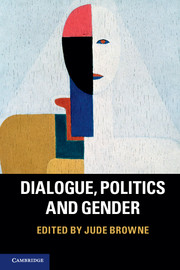Book contents
- Frontmatter
- Contents
- List of contributors
- Acknowledgements
- Introduction
- 1 Women and the standpoint of concrete others
- 2 Gender, discourse and non-essentialism
- 3 Universalism in feminist international ethics
- 4 Language, gender, dialogue, ethics
- 5 Between consensus and deconstruction
- 6 Trapped in a family portrait?
- 7 Gender, gesture and garments
- 8 What kind of dialogue do we need?
- 9 Deliberation, domination and decision-making
- Index
- References
6 - Trapped in a family portrait?
Gender and family in Nietzsche’s refiguring of authority
Published online by Cambridge University Press: 05 August 2013
- Frontmatter
- Contents
- List of contributors
- Acknowledgements
- Introduction
- 1 Women and the standpoint of concrete others
- 2 Gender, discourse and non-essentialism
- 3 Universalism in feminist international ethics
- 4 Language, gender, dialogue, ethics
- 5 Between consensus and deconstruction
- 6 Trapped in a family portrait?
- 7 Gender, gesture and garments
- 8 What kind of dialogue do we need?
- 9 Deliberation, domination and decision-making
- Index
- References
Summary
In the end . . . the old deep, heartfelt plea: become who you are. At first one must emancipate oneself from one’s chains, and in the end, one must also emancipate oneself from one’s emancipation.
Nietzsche to Lou Salomé, end of August 1882For it is only in the Dionysian mysteries, in the psychology of the Dionysian state, that the basic fact of the Hellenic instinct finds expression – its ‘will to life’. What was it that the Hellene guaranteed himself by means of these mysteries? Eternal life, the eternal return of life; the future promised and hallowed in the past; the triumphant Yes to life beyond all death and change; true life as the over-all continuation of life through procreation, through the mysteries of sexuality. For the Greeks the sexual symbol was therefore the venerable symbol par excellence, the real profundity in the whole of ancient piety. Every single element in the act of procreation, of pregnancy, and of birth aroused the highest and most solemn feelings. In the doctrine of the mysteries, pain is pronounced holy: the pangs of the woman giving birth hallow all pain; all becoming and growing – all that guarantees a future – involves pain. That there may be the eternal joy of creating, that the will to life may eternally affirm itself, the agony of the woman giving birth must also be there eternally.
All this is meant by the word Dionysus.
Nietzsche, Twilight of the Idols- Type
- Chapter
- Information
- Dialogue, Politics and Gender , pp. 146 - 172Publisher: Cambridge University PressPrint publication year: 2013



